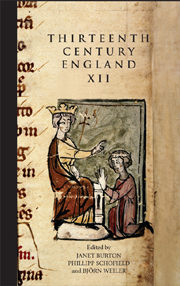Book contents
- Frontmatter
- Contents
- PREFACE
- LIST OF CONTRIBUTORS
- LIST OF ABBREVIATIONS
- The English and the Welsh in Fouke le Fitz Waryn
- Royal Piety in Thirteenth-century Scotland: The Religion and Religiosity of Alexander II (1214–49) and Alexander III (1249–86)
- The 1213 Pipe Roll and Exchequer Authority at the End of John's Reign
- The Public Debate during the Baronial Rebellion
- Richard of Cornwall and the Baronial Opposition in 1263
- Les liens personnels entre les cours de France et d'Angleterre sous le règne de Philippe III, 1270–85
- The Lay Opposition to Edward I in 1297: Its Composition and Character
- Peacekeepers and Lawbreakers in London, 1276–1321
- ‘The peace less kept’? The Origins, Revelations and Impact of Edward I's ‘Trailbaston’ Commissions of 1305–7
- Notes and Documents
Peacekeepers and Lawbreakers in London, 1276–1321
Published online by Cambridge University Press: 12 September 2012
- Frontmatter
- Contents
- PREFACE
- LIST OF CONTRIBUTORS
- LIST OF ABBREVIATIONS
- The English and the Welsh in Fouke le Fitz Waryn
- Royal Piety in Thirteenth-century Scotland: The Religion and Religiosity of Alexander II (1214–49) and Alexander III (1249–86)
- The 1213 Pipe Roll and Exchequer Authority at the End of John's Reign
- The Public Debate during the Baronial Rebellion
- Richard of Cornwall and the Baronial Opposition in 1263
- Les liens personnels entre les cours de France et d'Angleterre sous le règne de Philippe III, 1270–85
- The Lay Opposition to Edward I in 1297: Its Composition and Character
- Peacekeepers and Lawbreakers in London, 1276–1321
- ‘The peace less kept’? The Origins, Revelations and Impact of Edward I's ‘Trailbaston’ Commissions of 1305–7
- Notes and Documents
Summary
For anyone encountering it for the first time, the roll of crown pleas from the London eyre of 1321 (JUST 1/547A) must have a fair claim to be the single most alarming medieval document to be found in The National Archives, a remorseless catalogue of lurid vice and crime. Two men take a prostitute to a latrine in London wall, where a quarrel as to who shall possess her first in this salubrious spot leads to one man striking the other dead. Another latrine is found to contain a man's head; whose it was and how it came there no-one knows. A chaplain persuades a young man to grant him sexual favours in the church of All Saints Barking; the deed done, he sodomises him with a stick (cum quadam virga in fundamento), inflicting a mortal injury. Numerous killings are attributed to hatred and rancour. Many more result from apparently spontaneous quarrels, themselves all too often arising from trivial causes. A debt of 1d, a delay in bringing a penny's worth of wine, a stray lamb eating a man's pot plants – all trigger off exchanges of words and blows that lead to violent death. So bleak is the seemingly endless sequence of cruelty and rage that presentments of official corruption come almost as light relief, while the purely physical squalor of Rother Lane in East Cheap, described as fouled by putrid blood, fetid water and other filth generated by the slaughter of animals, constitutes a welcome change from the social anarchy that to outward appearances prevails all over London.
- Type
- Chapter
- Information
- Thirteenth Century England XIIProceedings of the Gregynog Conference, 2007, pp. 107 - 122Publisher: Boydell & BrewerPrint publication year: 2009



